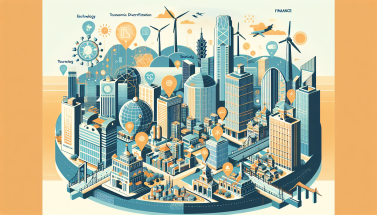
During a recent visit to Macau, Chinese President Xi Jinping emphasized the pressing need for the region to pivot its economy away from a strong dependence on the gaming industry. His comments were made during celebrations for the 25th anniversary of Macau’s handover to China and followed the swearing-in of the new Chief Executive, Sam Hou Fai. Xi noted that although the economy of Macau has shown significant recovery post-pandemic, the region must lessen its reliance on its casino sector. “Efforts should be made to promote moderate economic diversification[…] and focus on cultivating new industries with international competitiveness,” Xi declared.
Challenges of Reliance on Gaming
Macau's GDP experienced an 11.5 percent rise in the first three quarters of 2024. Nevertheless, a staggering 81 percent of government revenue continues to originate from gaming-related taxes. This heavy dependency presents risks as underscored during the pandemic. Consequently, central authorities are advocating for a shift towards a more diversified economic structure. In 2022, Macau's six casino operators managed to renew their licenses only after committing to invest $14.9 billion ($20.13 billion) in non-gaming ventures such as theme parks and conference centers. Additionally, six historical zones, one for each operator, have been identified for revitalization efforts.
New Strategies for Economic Growth
Macau’s new Chief Executive, Sam Hou Fai, echoed President Xi's sentiments by highlighting the necessity to tackle economic imbalances. He stressed prioritizing areas affecting residents' lives such as social security, healthcare, elderly care, and urban redevelopment. Sam proposed enhancing the '1+4' strategy, which focuses on developing emerging industries like MICE, technology, health, and finance, while also supporting traditional sectors and small to medium-sized enterprises (SMEs). Xi Jinping also emphasized the importance of optimizing the business environment and revising trade laws to attract global investments.
The development of Hengqin is part of efforts aimed at diversifying Macau’s economy and enhancing living standards for its residents. The Central Government outlined a series of measures to back Macau’s growth, including raising the tax exemption cap for goods for personal use bought by visitors from China. Visitors can travel multiple times between Macau and Hengqin within a seven-day period during excursions.
Moreover, China increased the number of cities allowed 'individual visas' for visits to Hong Kong and Macau by ten. Efforts have also been made to broaden the tourist base, most of whom currently come from mainland China. In the first 11 months of 2024, Macau welcomed nearly 31.9 million visitors, a 26.2 percent boost compared to the same timeframe last year, reaching 87.8 percent of the 2019 levels. November surpassed expectations as Macau hosted more international tourists than in the same month of 2019 for the first time since the pandemic ended, with over 241,000 visitors from outside China, marking a 20.9 percent increase compared to November 2023 and 7 percent over November 2019 figures. Still, most visitors (89 percent) in November originated from China or Hong Kong.
In August, the Macao Government Tourism Office (MGTO) initiated a draw for 100 travel packages, including flights and hotel stays for international tourists participating in an online survey. MGTO Director Maria Helena de Senna Fernandes expressed hopes to welcome over three million international tourists by 2025.
Source: China’s President urges Macau to continue diversification drive away from gaming, Asian Gaming Brief, December 20, 2024.
Dec 20 2024



Comments
No comments for this article.